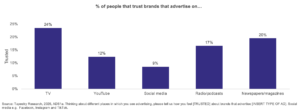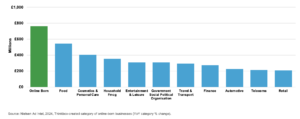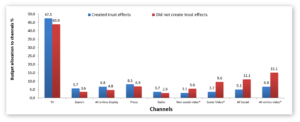Trust: TV's Super Power

Trust is TV’s Super Power
Trust sits at the heart of effective advertising. In a world where people are surrounded by competing messages, TV continues to stand out as the UK’s most trusted advertising medium. Its long‑established regulation, high‑quality programming, and cultural presence give TV a reliability that other channels struggle to match.
Trust Really Matters
Trust shapes how people respond to advertising. When viewers believe what they see, they’re more likely to act. According to Peter Field’s analysis of the latest IPA Effectiveness Databank, trust is now the second‑most important brand attribute driving profitability—just behind perceived quality. These two factors are increasingly intertwined, and TV remains the medium that delivers the strongest trust effects.
Why Do People Trust TV?
- Clearcast reviews every UK TV ad to ensure accuracy, appropriateness, and decency.
- TV programmes are held to high editorial standards, creating a safe environment for advertising.
- TV avoids the issues common in online advertising such as fraud, data misuse, or inappropriate placement.
- The public nature and perceived expense of TV advertising lend brands credibility and authority.
(credit: ThinkBox)
The Power of TV
Research such as Signalling Success 2 (EssenceMediacom, 2024) shows that brands on TV are viewed as more trustworthy, confident, and successful. Richard Shotton’s work also highlights how public commitment and costly signalling fuel trust—something TV naturally delivers.
Production costs have reduced dramatically, making it easier than ever to produce high‑quality ads. At Chase Media, we support new and growing brands from creative development through to clearance, planning, buying, and post‑campaign analysis.
Context Matters
Thinkbox’s Context Effects (2024) found that TV ads are seen as 44% more trustworthy and 39% more entertaining when viewed alongside high‑quality professional content. The shared in‑home environment further boosts trust and attention.
What About Gen Z?
Channel 4’s Gen Z: Trends, Truth and Trust study reveals a generation navigating misinformation:
- They trust influencers and friends’ posts nearly as much as journalists.
- A third trust alternative online media over traditional news.
- Half are concerned about social media’s impact on their lives.
TV’s regulated, consistent environment offers a stable counterbalance and remains a cultural anchor for trustworthy storytelling and advertising.
The Findings Are Consistent
A wide range of studies support TV’s trust advantage:
- Ipsos: TV ads are most trusted at 35%, compared to 6% for social media.
- Edelman Trust Barometer 2025: Social media is the UK’s least‑trusted sector.
- Signalling Success: video‑sharing sites and social platforms deliver the lowest levels of brand trust.
- YouGov: traditional media—TV, cinema, radio, print, and OOH—consistently out‑perform social platforms.
- Tapestry Research: 24% of people trust brands that advertise on TV.

Virtual Businesses Are Legitimised by TV Advertising
Online brands increasingly use TV to build authenticity, visibility, and trust. They are now among the largest investors in TV advertising because it consistently enhances credibility and effectiveness.

